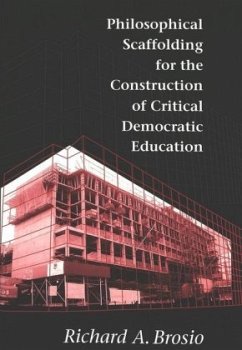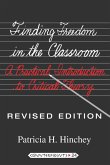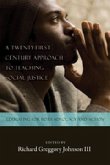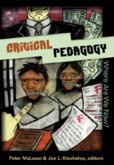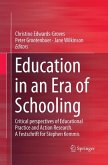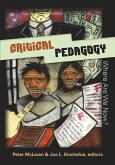This book offers description and analysis of philosophies that can provide scaffolding and justification for the construction of critical, democratic, educational theory and practice. The reader is presented with a broad, historical treatment of ideas in their social, political, economic, and educational contexts; moreover, the perennial quest for certainty is contrasted with those who have decided it has always been an unhappy, unsuccessful, and dangerous quest. Richard A. Brosio argues that the scaffolding and building materials for the construction of critical, democratic education are best provided by those thinkers who recognize epistemological uncertainty, as well as the need for a broadly inclusive human attempt to make sense of our experiences, education, and world. The cast of characters includes classical Greeks, Marx, Dewey, existentialists, liberationists, Freire, politics of identity thinkers, and postmodernists - along with a touch of green.
«With passion, clarity, and a formidable range of scholarship, Richard A. Brosio presents a bracing synthesis of classic and contemporary educational thought. He is at once respectful yet appropriately critical of his sources: great and challenging thinkers - from Plato to Freire and beyond - who have shaped our understanding of teaching and learning. This book richly enlightens by stimulating both intellectual and moral reflection on the way we see our schools. It is a valuable resource for students of philosophy and foundations of education, critical pedagogy, the history of education, and related fields. I recommend it for anyone who seeks a broader understanding of schooling and society and is unafraid to question some of our most basic assumptions.»
(David Blacker, Assistant Professor, School of Education, University of Delaware)
«Building upon the insights of his 'A Radical Democratic Critique of Capitalist Education', Richard A. Brosio's marvelous discussion of important theorists and theories that have influenced education is invaluable for students and teachers. Writing in an engaging personal style that explains complex theoretical issues clearly, Brosio invites the reader to take part in historic dialogues in philosophy of education. Although he highlights influential thinkers, he never loses sight of the fact that working people have struggled against class, gender, and racial barriers to extend the blessings of democracy and education to all. He affirms the genuine progressive ideals of the Enlightenment in an analysis that is powerful and moving. Resting upon a foundation of Deweyan, existentialist, Freirean, and Marxist insights, his fair critique of postmodern and identity politics links class, gender, and race and reminds us that all identities ultimately reside within a capitalist political/economic context. He connects these to an ecological awareness of Mother Earth. This is an exceptional and vital work that will provoke strong and passionate reactions - as it should. It forces us to rethink many of our cherished notions about education and society.»
(John Marciano, State University of New York, College at Cortland)
(David Blacker, Assistant Professor, School of Education, University of Delaware)
«Building upon the insights of his 'A Radical Democratic Critique of Capitalist Education', Richard A. Brosio's marvelous discussion of important theorists and theories that have influenced education is invaluable for students and teachers. Writing in an engaging personal style that explains complex theoretical issues clearly, Brosio invites the reader to take part in historic dialogues in philosophy of education. Although he highlights influential thinkers, he never loses sight of the fact that working people have struggled against class, gender, and racial barriers to extend the blessings of democracy and education to all. He affirms the genuine progressive ideals of the Enlightenment in an analysis that is powerful and moving. Resting upon a foundation of Deweyan, existentialist, Freirean, and Marxist insights, his fair critique of postmodern and identity politics links class, gender, and race and reminds us that all identities ultimately reside within a capitalist political/economic context. He connects these to an ecological awareness of Mother Earth. This is an exceptional and vital work that will provoke strong and passionate reactions - as it should. It forces us to rethink many of our cherished notions about education and society.»
(John Marciano, State University of New York, College at Cortland)

